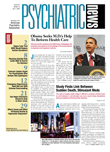New training guidelines from federal mental health officials aim to improve the treatment of addiction patients who are displaying depressive symptoms that fall short of diagnosable depression.
“Treatment Improvement Protocol (TIP) 48: Managing Depressive Symptoms in Substance Abuse Clients During Early Recovery” was issued in April by the Center for Substance Abuse Treatment, an agency of the Substance Abuse and Mental Health Services Administration, to offer best-practices guidelines for substance abuse counselors, most of whom are not licensed to treat depression.
The new TIP is geared toward clinicians working in public and private treatment facilities, as well as clinical supervisors in the mental health, criminal justice, primary care, and other health care settings. The publication is designed to enhance the training of substance abuse treatment counselors, including describing for them the best ways to work with patients with depressive symptoms, how to screen and assess such patients, and when to refer patients with diagnosable depression for medical treatment.
This information is expected to be very helpful to many people in the addiction treatment field. “Given the high prevalence of depressive disorders among substance abusers, this TIP addresses a very common problem seen by clinicians,” said Marc Galanter, M.D., a leading expert in addiction treatment, in an interview with Psychiatric News.
The TIP is not intended to help its target audience—substance abuse counselors—diagnose or treat depressive illnesses that are of a severity that qualify them for a DSM-IV diagnosis, because doing so would be outside of their scope of practice. The counseling recommendations described are, however, “legally and ethically appropriate for substance abuse counselors to undertake in all 50 states and the District of Columbia,” the TIP points out.
The new guidelines were developed because depressive symptoms can interfere with the recovery of substance abuse patients and their ability to participate in treatment, according to the TIP's authors. Problems caused by depressive symptoms in treatment can, for example, include poor concentration that can interfere with group-therapy sessions or participation in a 12-step meeting.
The TIP focuses on the first year of recovery from addiction, which is when depressive symptoms are particularly common.
Chapters describe topics such as the nature of depressive symptoms, their relationship to withdrawal effects, suicidality in people recovering from substance abuse, how depressive symptoms affect treatment participation, and“ approaches and psychosocial interventions” for substance abusers with depressive symptoms.
A literature review of studies on depressive symptoms is included in the TIP and focuses on research that addresses both clinical and administrative issues in the care of substance abuse patients with depressive symptoms.
The TIP stemmed from clinical research and the experience of clinicians pointing to the fact that many substance abuse patients have depressive symptoms. A 2002 national survey found that 40 percent of people with alcohol use disorder who were treated for substance abuse also had a mood disorder independent of their alcohol use. The survey found that 60 percent of people with a substance use disorder not related to alcohol use had an independent mood disorder.
“These findings indicate that it is likely you will encounter clients with substance use disorders who have depressive symptoms—as many as half of the clients you see,” according to the TIP, which was approved by an advisory board of clinicians led by Richard Rosenthal, M.D., a professor of clinical psychiatry at Columbia University College of Physicians and Surgeons.
Among the recommendations of the experts who wrote the TIP are the following:
•
Screen all substance abuse clients for depressive symptoms.
•
Ensure that substance abuse treatment for clients with depressive symptoms along with substance abuse is client centered and integrated.
•
Be aware that among the interventions that have shown success in managing depressive symptoms in people receiving substance abuse treatment are behavioral, cognitive-behavioral, supportive, and expressive therapies, as well as 12-step facilitation and motivational interviewing.
•
Be aware of the manner in which your attitudes toward clients with depressive symptoms can affect your ability to work with these individuals.
“TIP 48: Managing Depressive Symptoms in Substance Abuse Clients During Early Recovery” is posted at<www.kap.samhsa.gov/products/manuals/tips/pdf/TIP48.pdf>.▪
